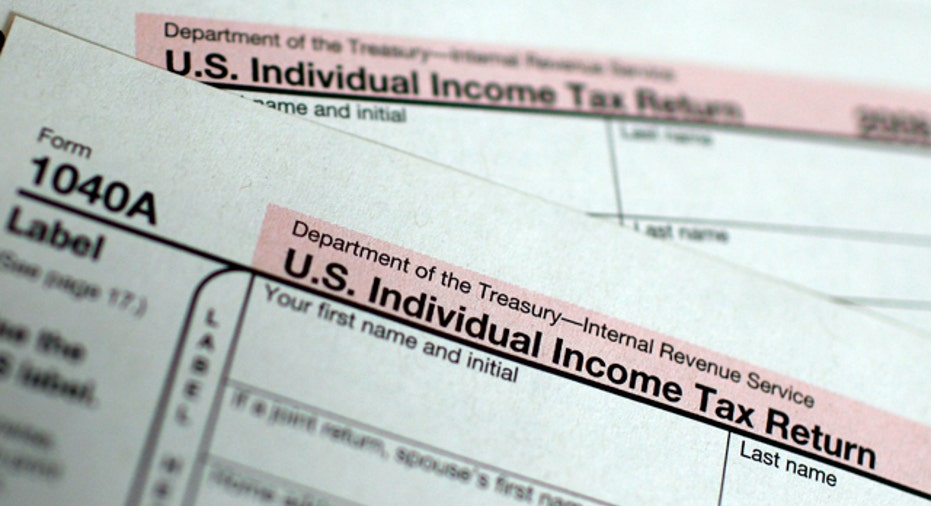Should You Pay Taxes With Your Credit Card?

If you're paying 2011 income tax to the IRS this year, you have several ways to pony up, including cash, personal check and your favorite credit card. A recent MSN poll of 954 readers found that only 8% of them plan to pay with a credit card. While there are positives to paying taxes with plastic, the experts we talked with say there are at least as many negatives.
Rewards points and convenience are two reasons for paying with a rewards credit card. But doing so will also generate service charges, and may incite the temptation to celebrate the payment of taxes by running up debt and the burden of additional interest. Here's a look at each of these pros and cons.
The pros
Convenience. One of the most obvious benefits of paying by credit card is convenience, says New York City attorney Barbara Weltman, a nationally-recognized expert on tax and small business and author of dozens of top-selling business books.
"The payment method can be used for both paper and e-filed returns," Weltman says. "And a confirmation number tells you that the payment has been accepted by the Treasury." In addition, you don't have to worry about the IRS having your credit card information because they never see it, according to Weltman.
Rack up rewards. Earning points with a rewards credit card can be another benefit. "But if points are your objective, you have to be disciplined enough to pay off your balances, so the benefits you're getting in points are not offset by paying interest," says Deborah Owens of Laurel, Md., author of "A Purse of Your Own".
Avoid IRS interest. Consider that by paying taxes with a zero-interest credit card, or any credit card that you pay off by the next due date, you avoid the interest and possible penalties of an IRS installment plan, Owens says.
Say you owe the IRS $10,000. Owens says you could enter into an installment agreement with the IRS, with three years being the maximum period over which you could extend that payment plan. You'll end up paying about $300 a month over that time in principal, but you will also pay interest. The interest rate changed on an installment plan through the IRS is the Federal short-term rate plus 3%, with that rate changing each quarter.
As of late February, the Federal short-term rate was 0.19%. With 3% added, you would pay interest of 3.19%. That's not nearly as attractive as the zero interest you'd pay for up to a year or more on many zero-APR credit cards.
Of course, that zero interest rate is likely good only for 12 or 24 months, but if your credit is good, you can try to move the balance from one 0% card to another.
"However, you must know yourself," Owens says. "You probably will want to establish your own payment installment plan, so you know you're totally paid off when that introductory 0% interest rate expires."
The cons
Convenience fees. While it's true the IRS doesn't charge anything for accepting credit card payments, there is a convenience fee charged by the authorized provider of up to 3.35%, according to Weltman.
That could negate any benefit you get by paying with zero-APR credit cards and earning rewards points. It's this point that is stressed by Matt Bell, author of MattAboutMoney.com.
"The way I lean on this is if you look at the service fees they charge for doing this, it doesn't make a lot of sense," Bell says. "If you are trying to rack up credit card rewards points, depending on the size of the amount owed in taxes, they (may) be offset by the fees you'll pay. And in some cases, it's more than a wash. You'll pay more in fees than those points will be worth to you."
If you can't afford to pay your full tax bill and your only choice is borrowing money, be sure you fully understand any and all fees you'll pay. "You'll have to compare the fees you'll pay by carrying the balance forward on your card with the cost of taking part in an IRS installment plan," Bell says.
Spouse may not agree. Paying taxes by credit card can be problematic for couples, say Colorado Springs-based Scott and Bethany Palmer, "The Money Couple," whose recent book is "First Comes Love, Then Comes Money".
If one is a risk taker and the other a security seeker, the former may want to pay with credit cards, but the latter won't, Bethany Palmer says.
Whatever choice they reach, they must forge an agreement. The security seeker may give in to the risk taker, agreeing to pay with a card if they can agree the amount will be paid off by a certain date, Scott Palmer says.
The original article can be found at CardRatings.com:Should you pay taxes with your credit card?



















